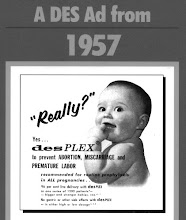
There are many aspects of DES exposure that can make us angry. DES Action NSW, especially during DES Awareness Week June 1-7 (on NSW Health Calendar), encounters many DES exposed enquirers who feel angry that they have only recently learnt about the dangers of DES. It is even sadder when these DES exposed people have learnt of the fact of their exposure only by chance through the volunteer organisation, DES Action NSW’s modest unfunded media campaigning.
Many people ask why the public hasn’t been told about DES and this raises complex questions about government since 1971 and questions about the reasoning for the non-existence of an ongoing government publicity campaign about DES. In spite of all available evidence, DES exposure is hardly ever mentioned as a risk factor in public health information about cervical and breast cancer (cancer information at the forefront), but appears mostly in vaginal cancer information (cancer information in a more background position). DES specific information is in the background and one must know about DES or one’s own exposure in the first place to know to search for this. Aside from clear evidence, the strong argument for the inclusion of DES exposure as a risk factor in public information about cervical, breast and vaginal cancer is found in the Cancer Council NSW DES and Cancer Position Statement (www.cancercouncil.com.au/editorial.asp?pageid=248) where it states that many people remain unaware of their exposure. Placing DES exposure information as far as possible in the forefront of public cancer information is a potentially life-saving public service and is overdue.
The kind of inconsistency in DES information described above is found across all state Cancer Councils. In response to DES Action NSW’s concerns, it is pleasing news that the Cancer Council NSW has decided to consult the Public Health Committee of the Cancer Council Australia about ensuring information about DES risks and the associated screening recommendations for breast and cervical cancer are consistent and present, particularly in breast and cervical cancer screening information.
There is similar inconsistency in the Australian Breast and Cervical Screening Program websites and DES Action NSW has forwarded this concern to the government Cancer Screening department.

No comments:
Post a Comment